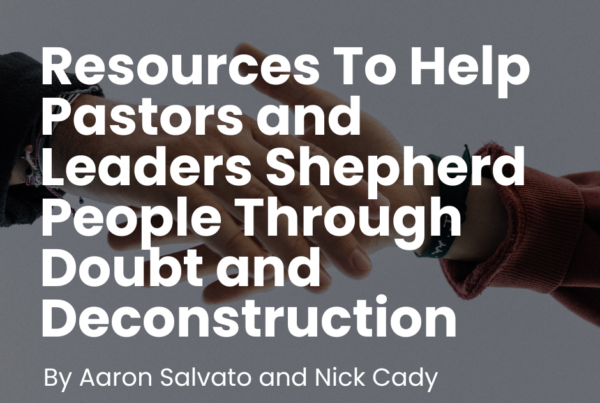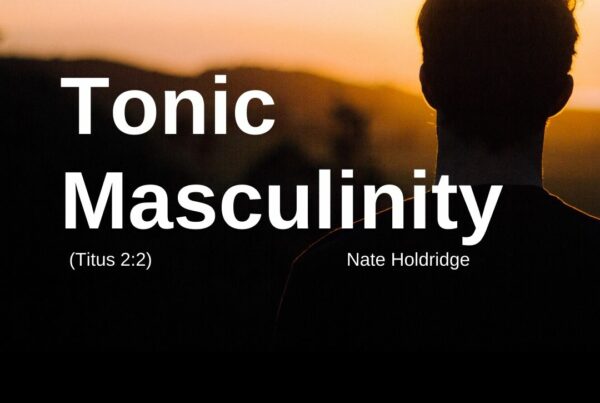
I believe that apologetics is more than a defense. It’s the presentation of an alternative to, or correction for, a non-biblical worldview. This includes friendship with God. Just like all friendships that change us, this type of relationship isn’t meant to remain private. Christopher Wright in writing about Israel’s mission to the world said, “Israel would have an intimacy with God and a quality of social justice that no other nation could match.”[1] He was explaining how one led to the other. It’s the idea that intimacy with God lived in the public sphere as a natural outflow of personal relationship would produce a new kind of social justice that the world couldn’t help but notice. I believe that’s one reason why it’s attractive to see the people of God bound together in love, working in unity.
Because love and unity are terms used not only by the Church today, it’s good to recognize what we mean when we say them. We hear these terms used by quite a few social movements open to a type of inclusiveness that excludes most evangelicals. Those movements have been effective in bringing awareness, causing many to rethink (or become entrenched) in their given position as they rally around the terms unity and love. They also do many of the things Christians do, like seek justice, act in compassion, and generally help make the world a better place. Though there is nothing wrong with that, I would like to pull back the theological covering to see what’s there. Because in seeking to love God and invite others to know Him, it’s important to understand where we stand and where we don’t. That way, we can seek a healthy solution to lead us into engagement with the world and friendship with God as an apologetic.
Inspiration Behind Social Action
Let’s first consider an example of what we don’t mean by friendship with God that confronts the world, so as to better understand what we do mean. This example is taken from a social movement from 2011 in New York’s Zuccotti Park called Occupy Wall Street, as shown in this video.[2]
The protest sought to curb private interests in politics, bank reform, reduce economic inequality and sought for student loan debt forgiveness.[3] Knowing this is still a hot political topic in the US, I want to ask for patience from my readers because I find this example illustrates my point (which is not intended to be political).
The bearded man donning the red t-shirt reading from his paper is Slovenian Philosopher Slavoj Zizek. As we look closely at the cell phone cinematography, we can see the springtide scene is carefully planned chaos. The press, students, tourists, curious, and well-dressed professionals from the financial district are present, even taking part in the scene. Dr. Zizek has turned the urban park into a type of worship service. The scene visually resembles many outreaches I’ve seen and been part of. Compared to the Manhattan population, they represent the small & the faithful, reaching out to the world. Although the “human microphone” form of protesting (where a protester speaks and the crowd repeats to amplify the sound) is not especially religious, Zizek’s words have transformed the experience. He speaks in the cadence of a priest while the “congregation” repeats the message sprinkled with biblical terms. Zizek says,
“What is Christianity? It’s the Holy Spirit. What is the Holy Spirit? It’s an egalitarian community of believers who are linked by love for each other, and who only have their own freedom and responsibility to do it. In this sense, the Holy Spirit is here now. And down there on Wall Street, there are pagans who are worshipping blasphemous idols.”
Theological Point of Reference Behind Social Action
In Zizek’s statement, a theology emerges that inspires his social activism. They aren’t calling sinners to repentance. They are denouncing a type of capitalism by using language that sounds more like church (i.e., pagans, worship, and idols). His reference to the Holy Spirit blurs the lines between the third person of the Trinity and humanity, which we will discuss later. To be fair, Slavoj Zizek is a philosopher who describes himself as both Orthodox and Christian atheist and is thus far removed from Evangelical Christianity.[4] In a Hegelian way, he’s applying the unity and love found in the Trinity to the way people are joined in a mutual project, like shutting down Wall Street. How are they unified? In what they call love. What do they believe? In the power to change. What is their theology? Possibly atheism but a recognizable type of Christian-based theology that promotes equality, love, and action, as it draws its inspiration from a concept of the Holy Spirit.
How are we to compare this to living out our friendship with God? We can recognize that they are using the Bible, promoting Christian values like love, unity, and justice, and sharing it with all who will hear. But our references and theologies are not the same. If we look for their theological point of reference, Zizek’s version of Occupy appears to be born out of a philosophic flow from Christian Existentialism, to a liberal form of Social Trinitarianism. Technical meanings aside, his train of thought flows from human reason and theological constructs with the help of scriptural themes. In biblical Christianity, our approach is the opposite; our goal is to begin with Scripture and allow it to shape our philosophy. That is generally how we apply our theology.
With that in mind, let’s circle back to the question of the Trinity. If we start with the doctrine of the Trinity as it relates to Genesis 1, we come to a sovereign God, creator, communicator, and Wholly Other. There is one mind, one will that is manifested in goodness and lovingkindness through His provision. But there’s a distinction between persons in conversation and even in the Spirit hovering over the waters. The unity isn’t in a common project, but it’s in His ontology; it’s who He is. Love is only one of His attributes.
The confusion comes when we think of three persons in modern terms. That being said, I don’t think Dr. Zizek misunderstood what he was saying. I believe he was using the elasticity of language to serve his point. But for the rest of us, when we think of “person,” we think of someone with a will and mind. That, if applied directly to the Trinity, would lead to heresy. It would be as if the Trinity were three separate beings unified in love rather than actually one essence. Zizek’s point then is like the unity of the protestors, being one in purpose but many in number. That’s not what the Nicene Creed teaches about the triune God. Better yet, as it says in Deuteronomy 6:4, YHWH is one.
Personal Relationship with God Producing New Kind of Social Action
Why does this matter? Because we want to live out our friendship with God in such a way that the world around us is changed while we ourselves are being regenerated by the Sprit. It matters what we think about the Trinity and how we apply it because this leads to salvation. To paraphrase my friend Dr. Yannick Imbert, who explained one day over an amazing BBQ sandwich in Paris (yes, this mystery also exists), it’s the mystery of the Trinity— specifically in how it relates to Jesus and how He bore the fullness of our sin—that pushes us to profound worship. He, who existed eternally, took up our humanity to create a new humanity through His perfect work.
This is a mystery, but it’s an infectious one that’s reaching people from every tribe and tongue. Contemplating the Incarnation and the Trinity runs us straight into the limits of our mortality, abilities, and the extent of our solutions. It pushes us to fall to our knees. That’s when we find hope in the One who redeemed us and indwells us with His Spirit. This is the intimacy Christopher Wright recalled when speaking of Israel. Knowing God and being changed by our relationship with Him is dynamic. It’s destined to improve the lives of those around us so others can know Him too. It’s salvation through Jesus that leads to soul transformation and, one day, we pray, revival. Living out our friendship with the Lord in a public way that mirrors the private one helps prepare the terrain … before we open our mouths to speak. So, while we occupy the earth, we become a living protest against the reality of injustice. And the richest blessing of it all is it’s born out of friendship with God.
References
- Christopher J. H. Wright, The Mission of God: Unlocking the Bible’s Grand Narrative, IVP Academic Press, 2006, iBooks version, p. 551.
- https://www.youtube.com/watch?app=desktop&v=2pSuwY2-fms&fbclid=IwAR16NUAEQ_QKpzfDg_g0fGeRWVYEisLDfE0ah4Jw9JEJ-m2b7duYeVTYYi8
- https://en.wikipedia.org/wiki/Occupy_Wall_Street
- https://www.youtube.com/watch?v=CHsPQ705y38










